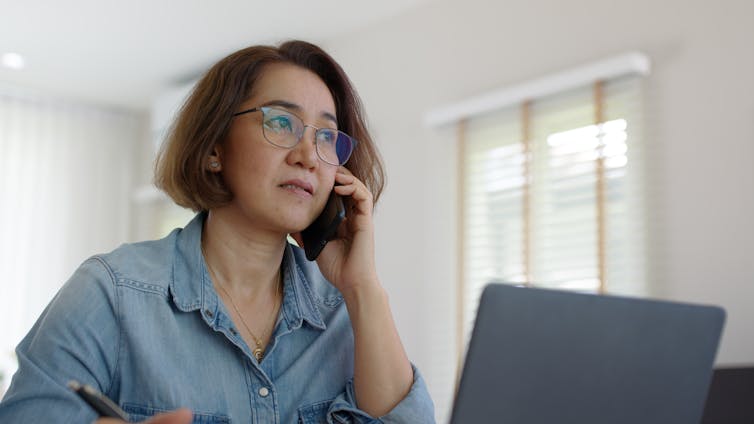
05 Mar Why do schools still always assume students have a mum and dad who are together?
This can leave separated parents ‘completely out of it’, report researchers Renee Desmarchelier, India Bryce and Kate Cantrell
In 1987, UK researchers lamented how schools were organised “around the assumption that the nuclear family is the norm”. Families who did not fit this model were “either ignored (tactfully) or categorised as abnormal”.
Several generations have passed through schools since then. And as we know, it remains very common for parents to be separated or divorced. In Australia, about 28% of children under 14 have parents who are separated.
But in our new research, interviewees report surprisingly little has changed in schools’ interactions with separated parents in the past 40 years.
They say schools still treat the nuclear family as the default and assume students have a mum and dad who are together.

Schools are preoccupied with the ‘primary parent’
We interviewed 11 separated parents about their experiences with their children’s schools. These parents were a subgroup from our previous study, which found that more than half of the separated parents surveyed had negative experiences with their children’s teachers, principals, and school administrators.
Our interviewees repeatedly talked about how school information systems (regardless of whether they were for private or public schools) required families to identify a “primary parent”.
This was the parent the school contacted to ask if the child was unwell or to discuss a school-related issue. This parent also received all school-related communications: newsletters, excursion notes, medical updates, report cards and invoices for school fees.
There seemed to be no way for school systems to accommodate diverse families for whom identifying a “primary parent” was more complicated.
A number of separated parents said they needed to “combat” the school to receive the same updates and information as the nominated primary parent. One father’s contact details had to be entered into the system’s allergy advice section to flag he should be contacted if his child became unwell.
Another father told us his child’s school insisted the primary parent “needs to be the mother”, even though he had majority care.

Peopleimages.com/Shutterstock
Parents can be kept in the dark
The type, amount and timing of information non-primary parents received primarily depended on their relationship with their ex-partner. For amicably separated parents, the situation was difficult but workable. As Amanda told us:
[One of the biggest challenges] is trying to work out ‘Did you get this email?’, ‘Did you get that one?’, ‘What’s happened with this note?’, and then kind of working out amongst ourselves how to best manage that if only one of us is receiving information.
But parents in high-conflict situations sometimes find themselves shut out by the other parent or the school itself.
Even though there were no court orders in place, Michael reported his children’s mother excluded him from school communications and withheld information, which made it impossible for him to be actively involved in his children’s schooling.
When I contacted the school and said, you know, that I either wasn’t receiving any information or that all the notices suddenly weren’t coming to me, they said, ‘Oh, we’re not going to get involved’. And so, I was left completely out of it.

Chai Te/Shutterstock
Situations can be manipulated
Parents also reported the primary parent can manipulate school interactions. In high-conflict relationships, school information can be used to elevate one parent into a position of power.
Again, Michael explained how his children’s mother kept important information about school fees and homework from him. His ex-partner’s legal team then used his non-payment of fees and lack of signatures in a homework book to demonstrate Michael’s purported lack of engagement in his child’s schooling and to imply his negligence as a parent.
This is an extreme example. However, Michael’s situation speaks to the complex politics of parent-school engagement.
While some parents found teachers open and receptive to involving both parents, others reported some teachers “take sides” and can be unresponsive to parent requests for basic school-related information.
What about step-parents?
Some parents in our study had become step-parents after re-partnering. These parents explained they were heavily involved in the day-to-day lives of their step-children, but the school did not recognise them as parental figures.
Step-parents didn’t have access to parent-teacher interviews, school reports, or even basic information about school activities. While acknowledging the primacy of the biological parent, step-parents wondered why the school could not include all parent figures in a child’s education.
As Michelle explained:
I guess it takes a while to be fully recognised as a parent or carer […] It’s just that it would have been nice if there was a little bit more of a conscious effort from the school.
The nuclear family is still seen as ‘normal’
While working with separated parents is not a new phenomenon for schools, it seems to be an area where schools have made little progress.
Our research demonstrates that schools need more effective policies and procedures so that all parents can be included and involved. Schools also need improved support and education for staff on how to manage high-conflict co-parenting relationships.
Finally, school systems, including data infrastructures and software, must be able to accommodate and properly acknowledge diverse families.
As the 1987 study noted:
Until each school defines its philosophy of the family in a realistic way, teachers, parents, and pupils have no option other than to collude in maintaining the fiction that the nuclear family is normal.
Names have been changed.![]()
Renee Desmarchelier, Associate Professor, Critical Pedagogies, University of Southern Queensland; India Bryce, Senior Lecturer, Human Development, Wellbeing, and Counselling, University of Southern Queensland, and Kate Cantrell, Senior Lecturer, Writing, Editing, Publishing, University of Southern Queensland
This article is republished from The Conversation under a Creative Commons license. Read the original article.




